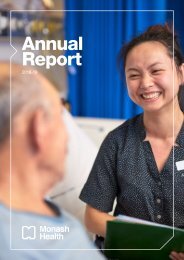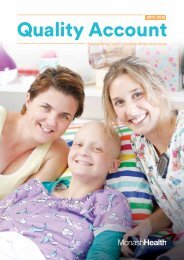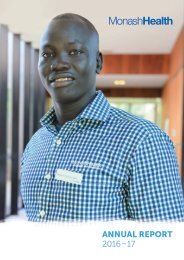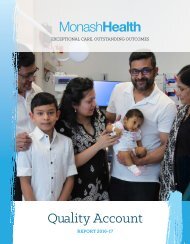U#3888_MH_ResearchReport (S)
You also want an ePaper? Increase the reach of your titles
YUMPU automatically turns print PDFs into web optimized ePapers that Google loves.
Monash Health<br />
Hudson Institute Research Group Head, Dr Rebecca Lim.<br />
Photo courtesy of Hudson Institute of Medical Research<br />
The future of stem cell<br />
therapies<br />
What if the regenerative properties<br />
of stem cells – their ability to repair<br />
tissue – could be explained by<br />
nanoparticles containing potent<br />
biological ‘cargo’ released by<br />
these cells?<br />
Dr Rebecca Lim, head of the Amnion<br />
Cell Biology Group, is at the forefront<br />
of the next generation of cell-free<br />
regenerative medicine.<br />
Exosome therapeutics are a new<br />
alternative to traditional stem cell<br />
therapies and Dr Lim is taking a<br />
pioneering approach using amnion<br />
epithelial stem cells.<br />
Dr Lim is a lead investigator on<br />
multiple clinical trials using these cells<br />
to repair scarred and damaged cells in<br />
chronic, premature lung disease and<br />
end-stage liver fibrosis – diseases at<br />
opposite ends of the human lifespan.<br />
While current stem cell therapy<br />
approaches are promising, there<br />
are challenges that limit their use,<br />
including high production costs and<br />
the need for specialised equipment<br />
to store, transport and prepare<br />
these treatments.<br />
Based on her team’s research, Dr Lim<br />
is developing a low-cost, cell-free<br />
regenerative treatment using exosomes<br />
extracted from amnion epithelial<br />
stem cells.<br />
In December, Dr Lim was awarded<br />
a prestigious project grant from<br />
the National Health and Medical<br />
Research Council (NHMRC) to<br />
investigate amniotic exosomes as a<br />
potential off-the-shelf treatment for<br />
bronchopulmonary dysplasia (BPD).<br />
“BPD is a chronic lung disease that<br />
occurs in babies born too early. It’s<br />
expensive to treat and complications<br />
from treatment can lead to lifelong<br />
health problems,” Dr Lim says.<br />
“Our vision is to develop a treatment<br />
that could be administered easily and<br />
cost-effectively to preterm babies with<br />
BPD – even by parents after babies are<br />
discharged from hospital.”<br />
What are exosomes?<br />
Exosomes, or cell-derived<br />
vesicles, are naturally occurring<br />
particles approximately 1/1000 th<br />
the size of a fine grain of sand.<br />
They are present in many bodily<br />
fluids. Many cells, including<br />
amnion epithelial cells (stem cells<br />
found in the innermost layer of<br />
the placenta), release exosomes,<br />
which contain important proteins<br />
and other genetic material that<br />
can be transferred to other cells<br />
where they can affect function<br />
and physiology.<br />
14








